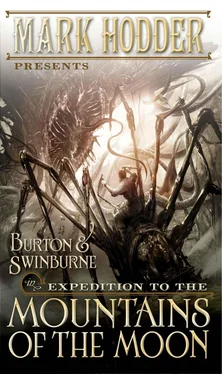Mark Hodder - Expedition to the Mountains of the Moon
Здесь есть возможность читать онлайн «Mark Hodder - Expedition to the Mountains of the Moon» весь текст электронной книги совершенно бесплатно (целиком полную версию без сокращений). В некоторых случаях можно слушать аудио, скачать через торрент в формате fb2 и присутствует краткое содержание. Жанр: sf_stimpank, на английском языке. Описание произведения, (предисловие) а так же отзывы посетителей доступны на портале библиотеки ЛибКат.
- Название:Expedition to the Mountains of the Moon
- Автор:
- Жанр:
- Год:неизвестен
- ISBN:нет данных
- Рейтинг книги:5 / 5. Голосов: 1
-
Избранное:Добавить в избранное
- Отзывы:
-
Ваша оценка:
- 100
- 1
- 2
- 3
- 4
- 5
Expedition to the Mountains of the Moon: краткое содержание, описание и аннотация
Предлагаем к чтению аннотацию, описание, краткое содержание или предисловие (зависит от того, что написал сам автор книги «Expedition to the Mountains of the Moon»). Если вы не нашли необходимую информацию о книге — напишите в комментариях, мы постараемся отыскать её.
Expedition to the Mountains of the Moon — читать онлайн бесплатно полную книгу (весь текст) целиком
Ниже представлен текст книги, разбитый по страницам. Система сохранения места последней прочитанной страницы, позволяет с удобством читать онлайн бесплатно книгу «Expedition to the Mountains of the Moon», без необходимости каждый раз заново искать на чём Вы остановились. Поставьте закладку, и сможете в любой момент перейти на страницу, на которой закончили чтение.
Интервал:
Закладка:
— From The Kasidah of Haji Abdu El-Yezdi , 1870
“Zanzibar city, to become picturesque or pleasing, must be viewed, like Stanbul, from afar.”
— From Zanzibar, City, Island, and Coast , 1872
ALGERNON CHARLES SWINBURNE (1837–1909)
Swinburne travelled widely in 1863, visiting Paris, Genoa, and Florence, and enjoyed perhaps his most productive period, writing many of his most celebrated poems.
“Here life has death for neighbour…”
— From “The Garden of Proserpine”
“The dense hard passage is blind and stifled…”
— From “A Forsaken Garden”
“One, who is not, we see; but one, whom we see not, is…”
– “The Higher Pantheism in a Nutshell” (complete poem quoted)
“A wider soul than the world was wide…”
— From “On the Death of Richard Burton”
HERBERT SPENCER (1820–1903)
In 1863, Spencer, having published the year before his First Principles of a New System of Philosophy , was rapidly emerging as one of the greatest ever English philosophers.
An extreme hypochondriac, he also had little patience for the excesses of Victorian attire, and preferred to wear a one-piece brown suit of his own design. Apparently, it made him look like a bear.
He said:
“Time is that which a man is always trying to kill, but which ends in killing him.”
GEORGE HERBERT WELLS (1866–1946)
By 1914, H. G. Wells was an established and popular author, a pioneer of science fiction.
“A time will come when a politician who has wilfully made war and promoted international dissension will be as sure of the dock and much surer of the noose than a private homicide. It is not reasonable that those who gamble with men's lives should not stake their own.”
“We were making the future, he said, and hardly any of us troubled to think what future we were making. And here it is!”
“Our true nationality is mankind.”
“I hope, or I could not live.”
RICHARD MONCKTON MILNES (1809–1885)
In 1863, Monckton Milnes was raised to the peerage, becoming the 1st Baron Houghton.
HENRY JOHN TEMPLE, 3RD VISCOUNT PALMERSTON (1784–1865)
1863, for Palmerston, marked the middle of his final term as British prime minister. Nicknamed “Lord Cupid” on account of his youthful appearance and rumoured affairs, he was a popular and capable leader.
WILLIAM SAMUEL HENSON (1812–1888)
A very industrious inventor, Henson is best known as an early pioneer in aviation. He created a lightweight steam engine that he hoped would power a passenger-carrying monoplane, the “Henson Aerial Steam Carriage,” but was never able to perfect the design. He also invented the modern safety razor.
FRANCIS HERBERT WENHAM (1824–1908)
A British marine engineer, Wenham came to prominence in 1866 when he introduced the idea of superposed wings at the first meeting of the Royal Aeronautical Society in London. His concept became the basis for the design of the early biplanes, triplanes, and multiplanes that attempted flight, with varying degrees of success. Wenham is possibly the first man to have employed the term “aeroplane.”
OSCAR WILDE (1854–1900)
In 1863, aged nine, Wilde started his formal education at Portora Royal School in Enniskillen, County Fermanagh.
“Education is an admirable thing, but it is well to remember from time to time that nothing that is worth knowing can be taught.”
“I can believe anything provided it is incredible.”
“Experience is one thing you can't get for nothing.”
“The tragedy of old age is not that one is old, but that one is young.”
“To get back my youth I would do anything in the world, except take exercise, get up early, or be respectable.”
“As long as war is regarded as wicked, it will always have its fascination. When it is looked upon as vulgar, it will cease to be popular.”
“Popularity is the one insult I have never suffered.”
“Whenever a man does a thoroughly stupid thing, it is always from the noblest motives.”
“To live is the rarest thing in the world. Most people exist, that is all.”
“Do not be afraid of the past. If people tell you that it is irrevocable, do not believe them. The past, the present, and the future are but one moment in the sight of God, in whose sight we should try to live. Time and space, succession and extension, are merely accidental conditions of thought. The imagination can transcend them.”
ISABELLA MAYSON (1836–1865)
Married to Samuel Beeton in 1856, Isabella was made famous by her Book of Household Management , which had been published in 1861. 1863 was the last healthy year of her life. In 1864, she contracted puerperal fever, which caused her death on 6th February 1865.
“A place for everything and everything in its place.”
— From The Book of Household Management
FERDINAND GRAF VON ZEPPELIN (1838–1917)
Count Zeppelin was a German general who later became an aircraft manufacturer. In 1863, he acted as an observer for the Union during the American Civil War, during which time he made his first ascent in a balloon. After serving in the Austrian and Franco-Prussian wars, he became increasingly fascinated by the prospect of steerable balloons and devoted himself to their development. By the turn of the century, his name was synonymous with rigid-framed powered airships.
ALEISTER CROWLEY (1875–1947)
An influential occultist, Crowley challenged the moral and religious values of his time, promoting a libertine philosophy-“Do what thou wilt”-that earned him notoriety and the reputation for being “the wickedest man in the world.”
He said:
“Ordinary morality is only for ordinary people.”
SIDI MUBARAK BOMBAY (1820–1885)
Captured by Arab slave traders when he was a young boy, Bombay was sold in exchange for some cloth, and was taken to India where he lived as a slave for many years. When his owner died, he was emancipated and returned to Africa, where he gained fame as a guide, working with Burton, Speke, Stanley, and Livingstone. In 1873 he traversed the continent from its east coast to its west.
MTYELA KASANDA (AKA MIRAMBO)
A Wanyamwezi warlord, he started out as a slave and ivory trader, travelling between Africa's great lakes and the coast, but later installed himself as king of the Urambo region. He was a sworn enemy of the Arabic traders at Kazeh. He died aged 44, after becoming too ill to rule.
GENERALMAJOR PAUL EMIL VON LETTOW-VORBECK (1870–1964)
The commander of the German East Africa campaign during the First World War.
MAJOR GENERAL ARTHUR EDWARD AITKEN (1861–1924)
Commander of the Indian Expeditionary Force “B” in Africa during the First World War.
JANE DIGBY (LADY ELLENBOROUGH) (1807–1881)
An English aristocrat, Digby was involved in numerous romantic scandals. She had four husbands and countless lovers before eventually settling in Damascus, where she married Sheikh Medjuel el Mezrab, who was twenty years her junior.
BLUT UND EISEN
Otto von Bismarck made his famous speech in support of increased military spending on 29th September 1862. “Blood and iron” was, in fact, “Eisen und Blut.” The words were reversed almost immediately by press reports and have remained that way in most accounts.
HMS ORPHEUS
The Orpheus was a Jason-Class Royal Navy corvette, constructed in Chatham Dockyard, England, in 1861. She was commanded by Captain Robert Burton and served as the flagship of the Australian squadron. On 7th February 1863, while navigating Manukau Harbour, New Zealand, the ship hit a sandbar and sank, with a loss of 189 men, including Captain Burton. Frederick Butler, a convicted deserter, served as quartermaster aboard the vessel.
Читать дальшеИнтервал:
Закладка:
Похожие книги на «Expedition to the Mountains of the Moon»
Представляем Вашему вниманию похожие книги на «Expedition to the Mountains of the Moon» списком для выбора. Мы отобрали схожую по названию и смыслу литературу в надежде предоставить читателям больше вариантов отыскать новые, интересные, ещё непрочитанные произведения.
Обсуждение, отзывы о книге «Expedition to the Mountains of the Moon» и просто собственные мнения читателей. Оставьте ваши комментарии, напишите, что Вы думаете о произведении, его смысле или главных героях. Укажите что конкретно понравилось, а что нет, и почему Вы так считаете.












